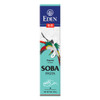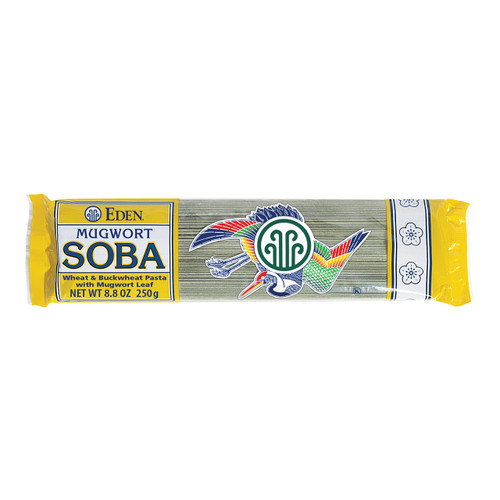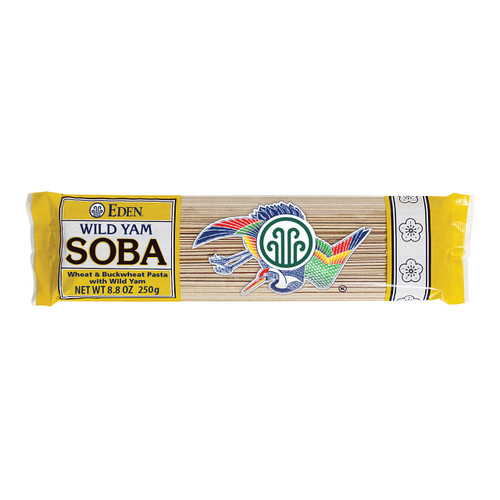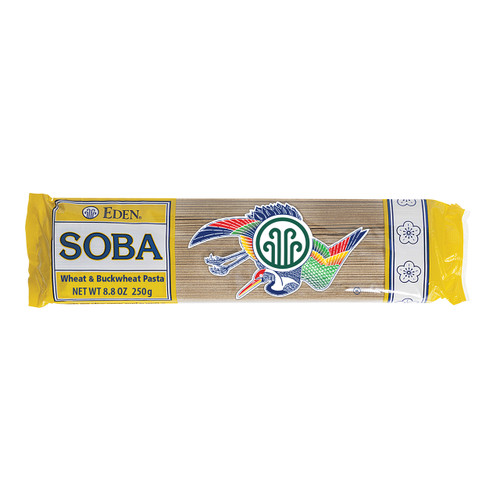Description
Soba noodles of North American family organic spring wheat 70% and organic whole buckwheat 30%, with a touch of Eden Sea Salt. Crafted at the Sobaya Company of Montréal, Canada. A warming, strengthening food and excellent source of thiamin B1. It provides protein, iron, niacin B3, magnesium, and zinc. Buckwheat is the best source of the important flavonoid rutin. Low sodium. Thoroughly satisfying in all recipes, stir-fries, salads, soups, and with a favorite sauce. Packed in reclosable boxes made of recycled paper, one of the most environmentally friendly recyclable packages available. ![]()
MORE DETAILS
Organic Eden Soba is North American family organic spring wheat 70% and organic whole buckwheat 30%, with a touch of Eden Sea Salt. Traditionally crafted at the Sobaya Company in Montréal, Canada using the same roll-and-cut process used for Udon and Soba in Japan. Sobaya Company imported Japanese equipment for North America's only certified organic, traditional soba and udon noodle factory. They make the finest soba and udon in the Western hemisphere.
Organic Eden Soba begins with freshly milled, Eden selected grain. Flour is kneaded with pure water and fine sea salt. Salt binds the dough, enhances flavor, and preserves the dried pasta. Dough is rolled out and folded onto itself eight times, then cut to length. Long strands of noodles are lifted onto racks, rolled into drying rooms, and allowed to dry slowly for up to two days depending upon thickness and ambient temperature/humidity. Dutifully tended, they are hand-cut and packed when perfectly finished. Patience and a no-shortcut approach create superior texture, flavor, and ultimately well nourished well-being.
Ecological Packaging
All Eden traditional organic Japanese pasta is packed in boxes made from recycled and recyclable paperboard, one of the most environmentally friendly packages available. According to the 100% Recycled Paperboard Alliance (RPA100.com), "Fourteen trees are saved for each ton of paperboard converted to 100% recycled paperboard. Trees are critical to the sequestration of CO2 (a greenhouse gas) in North America. For each ton of paperboard converted to 100% recycled paperboard, an equal amount of recovered fiber has been diverted from municipal landfills. Production of 100% recycled paperboard uses 50% less energy than virgin grades of paperboard, thus significantly reducing greenhouse gases released into the environment."
Nutritional Facts
Buckwheat does not contain gluten. The amino acid composition of buckwheat is nutritionally superior to all cereal grains, including oats. This is due to an especially high amount of the amino acid lysine that many cereal grains lack. Buckwheat is the best source of rutin, a vitamin C complex flavonoid.
Eden Organic Soba is a warming, strengthening food and excellent source of thiamin B1. It is a good source of protein, fiber, iron, niacin B3, magnesium, and zinc. According to the FDA, "Diets low in sodium may reduce the risk of hypertension or high blood pressure, a disease associated with many factors." Organic Eden Soba is low sodium, low fat, saturated fat and cholesterol free.
Commercial pasta is highly refined chemically treated flour, processed in minutes through teflon dies and ultra high heat or microwave drying resulting in inferior flavor, diminished nutrition, and dubious value. Eden Soba is a wise choice. Light, delicious and nourishing because it's made with patience, care, the best grain, and handling that enhances its value.
Eden traditional Japanese organic pastas are delicious, strengthening and nourishing. With so many different flavors of Eden pastas (and beans, sea veggies, condiments, and much more ... ) you can easily make healthy meals from your pantry in satisfying variety. Delicious in dashi - shoyu soy sauce kombu noodle broth and ideal in salads and stir-fries, with a dipping sauce, or any way you enjoy pasta. Try a Maitake Mushroom Hot Pot in the recipe section.
Traditional Cooking Instructions for Japanese Noodles
Soba and Udon can be boiled just like other pasta or you can use a traditional Japanese cooking method which takes a little longer but is well worth it. This method is called the shocking method, cold water is added to boiling water several times during the cooking process creating a firmer, al dente noodle. For this method place 2 quarts of cold water in a large pot, cover, and bring to a boil. Remove the cover, add the noodles, and stir to prevent sticking. As soon as the water comes to a boil again, add enough cold water to stop the water from boiling (about a 1/2 cup). Bring to a boil again, and add cold water again. Repeat one or two additional times until the noodles are done. Periodically check the noodles by removing a strand and biting or cutting it in half. If the center of the noodle strand is white and the outside is darker, the noodles are not done. When the center of the noodle is the same color as the outside, and the noodles are firm yet tender to the bite they are done. Rinse cooked Udon and Soba noodles under cold water. This lowers sodium and prevent clumping.


















